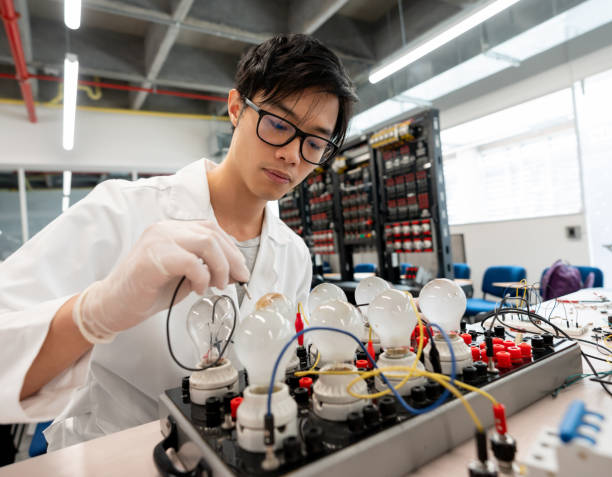Electrochemistry is a major topic in the Singapore O-Level Chemistry syllabus that often intimidates students due to its integration of theoretical concepts and experimental applications. However, with a clear understanding of the principles and consistent practice, students can master this topic and score highly in both multiple-choice and structured questions.
Electrochemistry includes topics such as electrolysis, redox reactions, and the reactivity series. This guide will cover essential concepts, common question types, and strategies to help students excel in Electrochemistry.

1. Understand the Basics of Electrolysis
Electrolysis is the chemical decomposition of a substance by passing an electric current through it. It involves:
- An electrolyte: a molten or aqueous ionic compound
- Two electrodes: anode (positive) and cathode (negative)
Key processes:
- Cation moves to cathode → gains electrons (reduction)
- Anion moves to anode → loses electrons (oxidation)
Mnemonic: OIL RIG – Oxidation Is Loss, Reduction Is Gain (of electrons)
2. Identify the Products of Electrolysis
Students must be able to predict the products formed during electrolysis based on:
- The type of electrolyte (molten or aqueous)
- The reactivity of ions present
Molten Electrolytes:
- Electrolyte: Pure ionic compound
- Only cation and anion from the compound are present
Example: Electrolysis of molten PbBr₂
- Pb²⁺ → Pb (at cathode)
- Br⁻ → Br₂ (at anode)
Aqueous Electrolytes:
- Water also ionises: H⁺ and OH⁻ are present
- Must compare reactivity of cations and anions to determine product
Example: Electrolysis of aqueous NaCl
- Cathode: H⁺ is reduced to H₂ (Na is too reactive)
- Anode: Cl⁻ is discharged (halide takes priority)
3. Learn the Reactivity Series
The reactivity series helps determine which ion is discharged at the cathode during aqueous electrolysis:
K > Na > Ca > Mg > Al > Zn > Fe > Pb > H > Cu > Ag > Au
- If metal is more reactive than hydrogen → hydrogen is discharged
- If metal is less reactive than hydrogen → metal is discharged
Example: Electrolysis of aqueous CuSO₄:
- Cathode: Cu²⁺ is discharged → copper is deposited
- Anode: OH⁻ is discharged → O₂ is produced
4. Know the Electrolysis of Brine (Industrial Importance)
Electrolysis of brine (concentrated NaCl solution) is commonly tested due to its industrial relevance.
Products:
- Cathode: H₂ gas
- Anode: Cl₂ gas
- Solution: NaOH remains
Uses:
- Chlorine: disinfectants, PVC
- Hydrogen: fuel, ammonia synthesis
- Sodium hydroxide: soap, detergents
Make sure to learn the half equations and industrial applications.
5. Write Ionic and Half Equations Accurately
Being able to write half equations is essential for structured questions:
- Na⁺ + e⁻ → Na (reduction at cathode)
- Cl⁻ → Cl₂ + 2e⁻ (oxidation at anode)
Always:
- Balance charges
- Ensure correct number of electrons
- Label the reaction as oxidation or reduction

6. Understand Electroplating
Electroplating involves coating one metal with another using electrolysis.
Setup:
- Cathode: the object to be plated
- Anode: the plating metal
- Electrolyte: solution containing ions of the plating metal
Example: Electroplating a spoon with silver
- Cathode: Spoon
- Anode: Silver rod
- Electrolyte: Aqueous AgNO₃
7. Apply Redox Concepts
Electrolysis is a redox process:
- Oxidation: loss of electrons at the anode
- Reduction: gain of electrons at the cathode
Practice identifying which species are oxidised and reduced. Assign oxidation numbers if necessary. Many questions test students’ understanding of redox in the context of electrolysis and displacement reactions.
8. Interpret Experimental Setups and Graphs
Students must be able to interpret diagrams of electrolysis setups and data from experiments:
- Identify electrodes and electrolyte
- Predict observations (e.g., bubbles, color changes)
- Understand gas volume ratios (e.g., electrolysis of water: H₂:O₂ = 2:1)
Be prepared to label apparatus and explain the function of each component.
9. Common Misconceptions and Mistakes
- Confusing electrode charges: Cathode is negative, Anode is positive in electrolysis
- Forgetting water ions in aqueous solutions
- Predicting the wrong discharged ion due to not applying the reactivity series
- Incorrectly writing half-equations or unbalanced equations
- Mixing up electrolysis with displacement reactions
10. Practice with Past-Year and Application Questions
Use Ten-Year Series and school exam papers to practice:
- Predicting products of electrolysis
- Writing equations
- Interpreting setups
- Explaining observations
Application questions may involve:
- Industrial electrolysis
- Electroplating
- Effects of concentration or voltage on products
Regular timed practice builds exam confidence and exposes students to different question types.
Conclusion
Electrochemistry may seem complex at first, but with consistent practice and a clear understanding of the principles, it becomes a manageable and scoring topic. Mastering electrolysis, redox reactions, and electrode processes is essential for excelling in O-Level Chemistry.
To succeed:
- Study the reactivity series and discharge rules
- Practice writing accurate ionic and half equations
- Understand experimental setups
- Clarify misconceptions early
By approaching the topic step-by-step and reinforcing it with regular practice, students can confidently tackle Electrochemistry questions and achieve top marks.
Pass O-Level Chemistry with flying colours with Focus Chemistry!
Focus Chemistry boasts 30 years of experience in teaching Chemistry to all levels of students. Whether you are looking to prepare for exams, go for Chemistry competitions, or simply bolster your foundation of basic Chemistry concepts, Focus Chemistry is the go-to Chemistry specialist in Singapore.
With time and effort, every student will surely be able to achieve their desired grades in Chemistry. Focus Chemistry has a tried-and-tested teaching method and specially curated materials and question banks to help you prepare for every Chemistry exam.
Feel more confident when you step into the exam hall and gain knowledge and experience answering many different permutations of Chemistry questions so that you will be well prepared to handle any question in your Chemistry exam paper.
Click here to book your slot with Focus Chemistry today!
